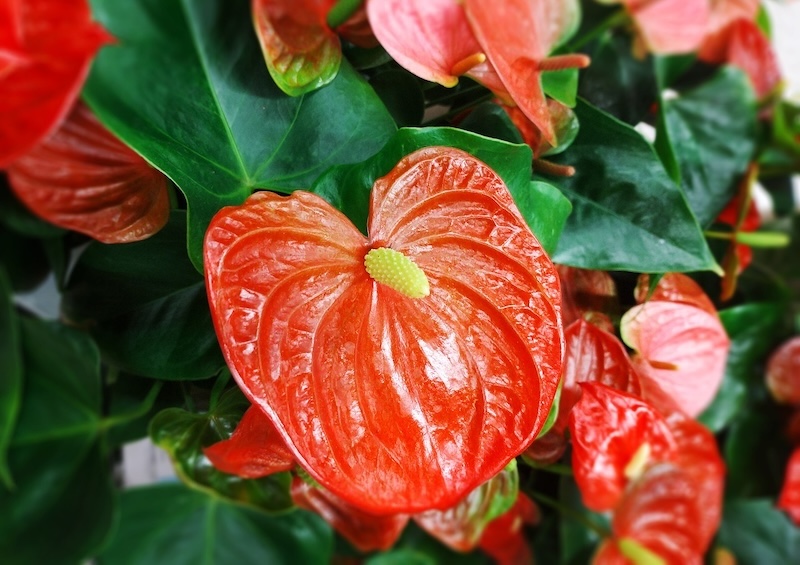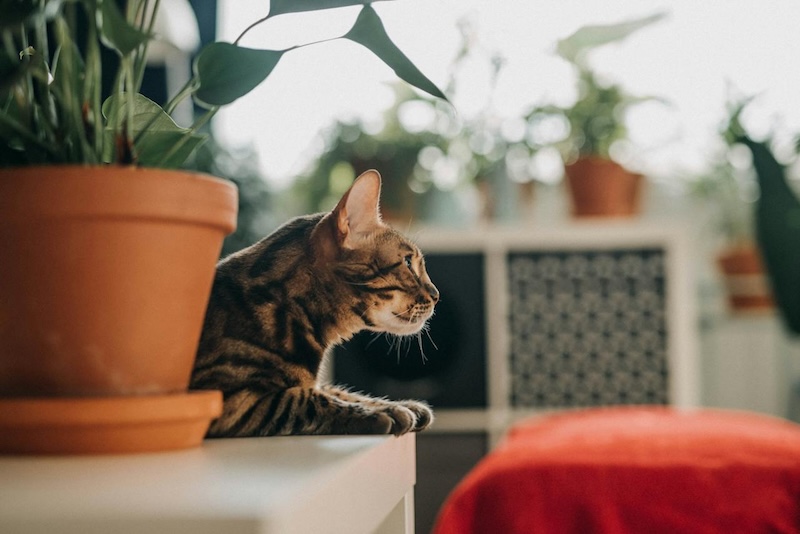Anthurium plants are considered harmful to pets and humans. These plants contain calcium oxalate crystals, which are considered an irritant. The entire plant is considered harmful if ingested in high quantities. Anthurium ingestion can cause swelling of the mouth, itching and burning, and difficulty swallowing. The sap inside the plant will be harmful if it comes in contact with pet or human skin.

Is Anthurium Poisonous to Children?
Anthurium is considered harmful for children, toddlers, and babies to ingest. Contact with the plant’s interior sap or juices can harm children, toddlers, and babies. The sap or juices are released if the plant’s foliage or stems are torn or crushed. A small amount of plant material can cause a harmful reaction in children or babies and should be avoided completely. It is best to keep Anthurium plants out of reach of small children.
Is Anthurium Poisonous to Dogs?
As in children, touching the sap or ingesting Anthurium is harmful for dogs and puppies. Ingesting even a small amount of any part of the Anthurium plant can be harmful; however consuming large amounts will be more toxic. If ingested, dogs may experience difficulty swallowing, swelling of the mouth, drooling, and mouth pain. Dogs are not attracted to the smell of Anthurium plants and will most likely keep their distance from the plants. Puppies are more at risk since they are more curious and mouthy.
Is Anthurium Poisonous to Cats?
Anthurium is also harmful for cats and kittens if ingested. Ingesting a small amount of any part of the Anthurium plant can harm a cat or kitten. Consuming large amounts of an Anthurium may cause difficulty swallowing, swelling of the mouth, drooling, and mouth pain. For the most part, cats are not attracted to the smell of Anthurium plants and will most likely avoid the plant, but it is best to keep the plant out of reach of cats and kittens.

Is Anthurium Poisonous to Other Animals?
Anthurium is also poisonous to other animals. Anthurium should not be ingested by birds, rabbits, hamsters, ferrets, hedgehogs, gerbils, mice, or rats. Other animals that ingest Anthurium will experience negative symptoms similar to those of cats and dogs.
Symptoms Of Anthurium Poisoning
Always check with your doctor or veterinarian for guidance if you suspect Anthurium poisoning.
Here are some common symptoms to look out for:
- Swelling of the mouth
- Drooling
- Difficulty swallowing
- Burning sensation in mouth
- Blisters may occur in mouth
Preventing Anthurium Poisoning
The best way to prevent Anthurium poisoning is by limiting exposure to the plant. Place your Anthurium in a location that is out of reach of pets and children. Monitor your pets and children when they are near the plant. If you cannot move your plant to a safer location, position a physical barrier around the plant such as another piece of furniture. Utilize obedience training techniques to teach your pet to keep away from houseplants. If you cannot manage a method to keep your pets and children safe from your Anthurium plant, it may be best to replace it with a less toxic plant.
Pet Poison Helpline
If something were to happen to your furry friend, and you suspect that they are suffering from Anthurium poisoning, there is a poison control hotline to call for 24/7 vet advice. It is called the Pet Poison Hotline, and their phone number is (855) 764-7661.
Sources:
"Anthurium." The North Carolina Extension Gardener Plant Toolbox. plants.ces.ncsu.edu
"Flamingo Flower." American Society for the Prevention of Cruelty to Animals. aspca.org
 |
Author Katie Endicott - Published 11-28-2023 |
